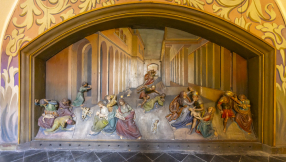
Jewish academic and Hebrew scholar Irene Lancaster reflects on the qualities of a good leader.
What is a leader?
We start the new year with the Book of Shemot (Exodus). In Chapter 1: 8-10, 'There arose a new king over Egypt, who knew not Joseph. And he said to the people: 'Behold, the people of the children of Israel is too many and too mighty for us. Come, let us deal wisely with them, lest they become too many, so that if by chance war is waged against us, they will join together with those that hate us, and fight against us, and go up out of the land.''
The co-author of the new book on Psalms, reviewed for Christian Today last week Reflections on Psalms, Rabbi Elie Spitz, informed me in a conversation over the New Year that his friend, Holocaust survivor, Elie Wiesel, told him that these words from Shabbat's Exodus Sedra are the first examples of antisemitism in world history, and that all subsequent antisemitism is based on this one passage.
The Hebrew of these three verses is surprisingly difficult for such a famous passage. However, they demonstrate the new Pharaoh's paranoic internal contradictions and bipolar personality. For the fact was that in the small section of Egypt allotted them, the Jews were a small minority, just as in diaspora today.
For example, in today's USA, Jews constitute 1.7% of the population. Here in the UK, we are only around 0.35%. Canada has just over 1% and France, given government policies, is now nearly Judenrein. Jews are around 0.4% of the French population, having come down from around 1% only 20 years ago (as was the UK, incidentally, even 50 years ago).
And so, as now in diaspora, not only were the Jews in Pharaoh's Egypt a very small part of the population, and not 'mighty', but also completely harmless, keeping mainly to themselves, grateful for being allowed to live there. However, Pharaoh has two contradictory thoughts about the Jews. The Jews are currently very powerful and mighty, but actually, they aren't, but might become so later and constitute a fifth colony, acting with the enemies of Egypt, not specified. And, moreover, as in Soviet Russia not so long ago, although the best idea would be therefore to let the Jews go before they actually make his illusion a reality, life must be made as awful for them as possible. Hence, the murder of their male babies and hard labour for the rest, but, in addition, these remaining Jews must nevertheless be stopped at all costs from leaving.
Yes, Egypt is mixed up, just as the world is today, especially where the Jews are concerned. For, hasn't the President of Harvard just resigned, after her evasive comments on antisemitism at a congressional hearing, subsequently compounded by serious accusations of plagiarism. But we don't need to go to the USA for the lack of leadership at university level. This week a student from the Religions and Theology Department of Manchester University, who was about to embark on a postgraduate research post in the same department at Cambridge, was found guilty of the most heinous murder of her boyfriend, and then blamed the whole thing on him. The judge told her she may never be released from prison for her crime, which was recorded for all to see. Her academic specialization was, apparently, ethics!
We can't look to our universities for real leadership, because it is the western university system which produces the so-called 'leaders' of the 'free world'. And neither can we look to the official churches, who have proved inadequate, and not least towards their Jewish brethren, whom they now blame very publically for the pogroms and worse initiated by Muslim terrorists on the happiest day of the Jewish year. And the behavior of a series of political leaders of different hues has made us extremely untrusting of the whole political edifice of the western world.
So where can we look for real leadership?
I recently came across a book actually called Leadership by the once much-feared wheeler dealer and shuttle diplomat, Henry Kissinger. Kissinger, who died very recently, aged 100, was born Jewish in Germany and came to the USA as a result of Hitler. I don't think that Judaism meant very much to Kissinger. None of the leaders he singles out for greatness in his book, subtitled 'Six Studies in World Strategy', are Jewish, and some of these leaders were, I would argue, hostile to Jews, and certainly towards the one Jewish State.
Moreover, some of the things Kissinger says about Israeli leaders Golda Meir and Yitzhak Rabin, for example, are well off the mark. His attitude to Israel signals a misunderstanding of the Jewish project, the absolute necessity of the survival of State of Israel for the future not only of the Jewish people, but of civilization itself. Plus, many think that Kissinger, by his dithering or worse, was responsible for the heavy losses suffered by Israel in the 1973 Yom Kippur War, the worst experience in Israeli history until the present crisis of October 7<sup>th and beyond.
However, he said the following:
'[Good] leaders elicit in their people a wish to walk alongside them.' 'Elicit', not browbeat, but gently coax. And then, he talks about a 'people' as does the Book of Exodus. He doesn't talk about subjection or coercion. His ideal leader is frankly more like a shepherd, gently leading his flock. He could be citing the 23<sup>rd Psalm, perish the thought (although that was reputedly written by King David in a war situation ....!).
What else does Kissinger say about leadership? [S]trategic leadership may be likened to traversing a tightrope: just as an acrobat will fall if either too timid or too audacious, a leader is obliged to navigate within a narrow margin, suspended between the relative certainties of the past and the ambiguities of the future.'
So, leaders 'walk a tightrope'. Where have we heard that before? The most impressive rabbi I have met, who has been cited before in these pages, led the first dialogue with the Roman Catholic Church, undertaken on behalf of the State of Israel in the year 2000 at the request of the Pope. However, six years later, during a conference of rabbis, which took place in France in February 2006, Chief Rabbi Shear Yashuv Cohen of Haifa, son of the Nazir of Jerusalem, great friend of Rav Kook, stated the following:
'The question of how far we should go in inter religious dialogue compels us to draw a fine line and walk with great care. On the one hand we seek rapprochement... on the other hand, we have to step back in order to emphasize our own distinctiveness.... G-d forbid that we should overstep the mark, religiously speaking... Anyone involved in inter religious relations needs to set out beforehand a clear set of parameters, so that both parties know from the outset what is distinctive to our own religion and what is part of our mission toward the wider world....'
A leader of a people, a nation, or a country, doesn't have much choice. Naturally they can resign, as President Nixon was forced to do, for example. However, most of them don't resign until it is too late. In the case of religious leaders, by contrast, they do tend to carry on, as Moses will have to do, until, his father-in-law, Jethro (not Jewish, by the way), advises him to start delegating.
Later, once in the Promised Land, Moses' chosen successor, Joshua, will incorporate delegation as an important part of his own leadership strategy. Elijah will find Elisha and lay his mantle on him at the right time. Kissinger seems to think that prophetic leadership is also part of the equation of political leadership. He doesn't talk much, if at all, about religious leadership per se, but sees the successful political leaders as needing a number of qualities that we tend to associate with religious or prophetic leaders, what Kissinger himself calls 'visionary'.
So, for example, the first post-war German leader, Konrad Adenauer, twice imprisoned by the Nazis, spent some time in a monastery and then 'shepherded Germany past the lowest point of its history'. Again, not coercion, but in the spirit of Biblical leaders. Most leaders are not visionary however, but managerial. It is during crises that we need leadership that is not managerial, but visionary, 'transformational', even. But vision must be tempered by 'wariness', entertaining a sense of 'limits', as Rabbi Shear Yashuv Cohen also pointed out.
Interestingly, Kissinger himself differentiates between what he calls 'psychiatric' and 'theological' approaches to negotiations with people deemed to be 'the enemy'. So, as Secretary of State, he persuaded President Nixon to halt the Vietnam War, as well as start making overtures to China. He couldn't change the character of the Chinese, but he could demonstrate a willingness at least to engage, but only by first increasing the security situation for the USA.
Engagement through strength is also what defined the Premiership of Margaret Thatcher. She was willing to engage the new generation of Russian diplomats, including Gorbachev, but only from a position of strength. A few years later, the Wall came down and the Soviet Union was finished – or so we thought .....
Singapore managed its amazing success in a tiny space, inhabited by a large number of minorities all vying with each other, by its leader, Lee Kuan Yew, stressing discipline, education, two languages, one's own native language and English (a brilliant move in my view – if only this could be done in this country) and complete fairness in jobs and opportunities.
When Muslim states refused to help him in setting up Singapore's army, he turned to Israel and ignored brickbats. Israel has a magnificent citizen army, which is the backbone of the country, and currently fighting in the most heroic manner. Lee was no fool. He could see what Israel, also surrounded by enemies, had managed, and he wasn't prepared to kowtow to Muslim antisemitism in pursuit of his dream for his own country.
As Kissinger, stated 'Great statesmen operate at the outer limits of what is thought possible.' Surely this was first true with Moshe Rabbenu, the Jewish people's greatest leader in a time of multiple crises, starting with the anti-Semitic and thoroughly psychopathic Pharaoh, reminiscent of Hitler, Sinyar and so many others of their ilk throughout their ages.
And yet, as Isaiah Berlin said of Churchill during the war years, he brought out what was already there, 'largely dormant until he had awoken it in them.' Moshe Rabbenu knew that the Jewish people had it in them. All they needed to do was to be encouraged to give up slavish habits and forge themselves into a new people, the new people that they were always destined to become.
For Kissinger, the imperatives for leadership are an education which also nurtures character, a sense of national identity, and a desire not for oneself but to serve one's fellow citizens. Towards the end of his book, he cites religious belief as an important part of this equation, citing the Catholic faith of Adenauer and Charles de Gaulle, as well as the Methodism of Margaret Thatcher (hopefully not the modern version though!).
He mentions that Egyptian president Anwar Sadat managed to 'transcend' his brand of Islam and transform it into something akin to what Islam could be like based in its Golden Age of the classical and medieval period. This is one reason that Sadat made overtures towards the Jewish State, and addressed the Israeli Knesset, before signing the Peace accord with Menachem Begin. For his pains, Sadat was soon assassinated by members of the Muslim organizations which went on to form Hamas and Islamic Jihad (sound familiar?!).
Kissinger also advocated 'civic patriotism' which is now on the wane, being replaced by 'identity-based factionalism'. He advocates the advantages of solitude, including the positive benefits from reading both widely and deeply in order to be able to calm oneself enough to make the right decisions as leader.
We know for instance that PM Harold Macmillan resorted to Jane Austen for solace, but no doubt also to get him in the mood for wise decision making. Kissinger regrets that in our overly visual and internet age, reading from books has more or less disappeared in the younger generations, which means they won't take the time, in his view, to mull over the many possibilities of decision making and end up acting wisely rather than rashly.
Kissinger doesn't say this of course, but the one western country where all these attributes still flourish is the State of Israel. Topping 10 million people this year, and therefore now larger in population than many European countries, Israel has a very large birth rate, including among the 'secular' community, a sense of nationhood and civic duty, a love of books, theatre, music and art, and a penchant for learning languages.
I will be saying more about all this in a book review I hope to write in the near future. However, for the present, let us remember that antisemitism as we know it today is not a new phenomenon. The great Elie Wiesel himself traces this 'causeless hatred' of the Jewish people back to the new Egyptian Pharaoh who 'didn't know Joseph.'
In other words, even in those days the Jews were no longer appreciated for their input into the places they inhabited in diaspora. Therefore, in order to survive and fulfil their destiny of serving the world, they simply had to leave where they were already living in diaspora and start anew in the only land where they felt at home, if not exactly safe.
This year heralds a very large number of elections including in the USA, the UK, India, the EU. No doubt there will arise, and maybe in this country too, a new Pharaoh who 'knows not' the Jewish people. In that case, thank goodness for the State of Israel, the one Jewish State, that is currently fighting for all our lives against a monster known in the Bible as 'a wild ass of a man'.....
But that is surely another story ..... As the accompanying Haftorah, from Isaiah 27 (verse 6) states, by contrast:
'In days to come, Jacob shall take root, Israel shall blossom and bud; and the face of the world will be filled with fruitage'.
The Israeli Knesset, the parliament, met for the first time on February 14, 1949. This date coincided that year with Tu B'Shvat, the New Year for Trees, chosen to mark the first sighting of the almond blossoming in Israel, a shaked, which also in Hebrew denotes 'awakening through watchfulness.' First Prime Minister of Israel, David Ben Gurion, was photographed at this historic moment near a sign, bearing the whole of this quote from Isaiah 27. If Israel blossoms and buds, the whole world will benefit. Surely a fitting rebuttal to the start of Exodus in which the world as it then was plans to annihilate the Jewish people. Israel's response: 'Let's make the world flourish'.













